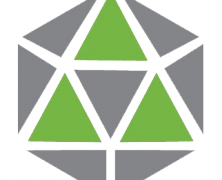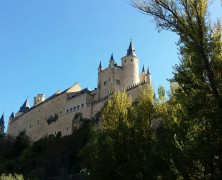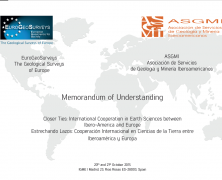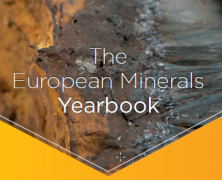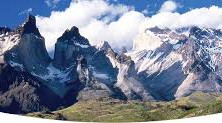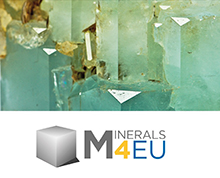PRESS RELEASE RAW MATERIALS INTELLIGENCE TO SERVE STAKEHOLDERS NEEDS 4 February Primary and secondary Raw Materials are essential to Europe’s economy and growth. The Minerals Intelligence Capacity Analysis (MICA) Project responds to the need to build a Raw Materials Knowledge Base at EU level, contributing to past and ongoing efforts by several EU projects and as part of the transitional phase towards this goal. The MICA Partners gathered together for the first time at the Project kick-off meeting held in Copenhagen on the 2-4 February 2016. The overall objective of MICA is to provide stakeholders with the best possible information, in a seamless and flexible way using a Web-based platform, the European Union Raw Materials Intelligence Capacity Platform (EU-RMICP). To reach this ambitious goal, MICA brings together a multidisciplinary team of experts, from natural and technical to social sciences, to ensure that the raw materials intelligence is collected, stored and made accessible according to stakeholders needs. The kick-off meeting, which included Technical Workshops, aimed at presenting all the Work Packages under which the activities will be carried and it introduced all the partners involved. The EU representatives presented the relevant policy frameworks and their expectations from the project. In particular, Mr Slavko Solar from the European Commission DG GROW, said that it is expected that MICA will contribute to shape the EU policy on Raw Materials and will foster the cooperation among past, current and future projects tackling the same issues. The cooperation with the industry, the KIC Raw Materials and the United States Geological Survey (USGS) is also considered as essential during the project lifetime. Indeed, representatives of those parties are part of the Advisory Board of the MICA Project. Background The MICA Project is coordinated by the Geological Survey of Denmark and...
Segovia brings together the Directors of EGS-ASGMI Geological Surveys: a perspective from the Spanish press
posted by EuroGeoSurveys
The Spanish newspapers “Adelantado de Segovia” and “El Norte de Castilla” reported about the EuroGeoSurveys (EGS) -Association of Geological and Mining Surveys of Ibero-America (ASGMI) Workshop held in Madrid from the 19th to 23rd of October, of which field trip “Urban geology and natural risks inside the city of Segovia” took place in Segovia on the 22nd October. The meeting of the Directors of the Geological Surveys of Europe and Latin American, as well as USA and Canada, has been particularly welcomed by the local press. The Memorandum of Understanding signed between EGS and ASGMI represents indeed a historical moment, possibly leading to funding opportunities for geological cooperation between the two continents under Horizon 2020. Moreover, the field trip allowed participants to discover the geological heritage of Segovia, and see a place where the human activities interfered with the geological process since more than 60,000 years, producing situations of natural risks and the exploitation of geological resources. The full article are available in Spanish: 2015-10-23, El Norte de Castilla, pag 12 2015-10-23, El Adelantado de Segovia, pag 14 2015-10-22, El Norte de Castilla, pag 8 2015-10-20, El Adelantado de Segovia, pag 10...
PRESS RELEASE: GEOLOGY CONNECTS TWO CONTINENTS
posted by EuroGeoSurveys
PRESS RELEASE GEOLOGY CONNECTS TWO CONTINENTS • More than 50 General Directors of the Geological Surveys of 20 Latin American countries and 34 European countries, together with the United States and Canada, will gather in Madrid from the 19th to the 23rd October to explore new ways of cooperation. • EuroGeoSurveys, the Geological Surveys of Europe, and the Association of Geological and Mining Surveys of Ibero-America (ASGMI), will celebrate the Annual Assembly at IGME Headquarters. IGME is member of both organizations and will host the meeting. This combination of national geological organizations of both continents has never happened before, therefore representing a historically relevant fact. • EGS and ASGMI will share a joint two day-workshop titled “Closer Ties: International Cooperation in Earth Sciences between Ibero-America and Europe” and will sign, for the first time in history, a collaboration agreement that will involve more than 14.000 professionals working within the members of the both organizations, which joint budgets will reach 1.500M€. • The World Bank and the European Commission (Directorate General for Internal Market, Industry, Entrepreneurship and SMEs and Directorate General for Development and Cooperation) will contribute with proposals for financing the Earth Sciences cooperation between the two sides of Atlantic. Madrid, 16th October 2015 The Workshop (that will be held in English and Spanish with simultaneous translation at the Gomez Pardo Foundation c/Alenza no. 1 on the 20th and 21st October) will be inaugurated by Marina Villegas, Director General of Technical and Scientific Research of the Ministry of Economy and Competitiveness, together with Jorge Civis, IGME Director, Santiago J. Muñoz Tapia, ASGMI President, and Koen Verbruggen, EGS President. The Workshop will focus on geological risks, mining and environmental conflicts, as well as institutional strengthening, for which will be studied possible European and international sources...
TAXPAYER FUNDED BOOST FOR EUROPEAN MINING INDUSTRY
posted by EuroGeoSurveys
PRESS RELEASE TAXPAYER FUNDED BOOST FOR EUROPEAN MINING INDUSTRY Brussels, 15 October In the wake of global economic slowdown and collapsing commodity prices, mining companies and consumers of minerals need to be ever more cost conscious if they are to survive. On the 15th October, the European Minerals Yearbook, first digital reliable source of information on minerals statistics and intelligence in Europe, was officially launched at the “Raw Materials Diplomacy Dialogue between the EU and Advanced Mining Countries” organized by the European Commission DG GROW and EASME in Brussels. Including 40 European countries, 65 commodities from primary minerals with a focus on the twenty critical raw materials for the EU, covering a 10-year span for production and trade, the Yearbook is meant to reduce costs and risks, and secure sustained supplies for European industries in the mining and manufacturing sectors. This comprehensive database contains detailed production pan-European information, therefore providing a new tool to the industry and EU decision-makers which before had to rely on fragmented and/or non-official sources. As MEP Mr Andrejs Mamikins stated: “The European Minerals Yearbook is a great achievement. It could, for instance, reinvigorate also my home country Latvia’s economy through a more efficient extraction and subsequent use of natural resources. It could allow Europe to be much more self-sufficient and not overly dependent on the United States Geological Survey agency. It is my hope that the newest yearbook shall open a new page in Europe’s quest for increased competitiveness and prosperity”. In his speech, Mr David Mair, Director for Policy Support Coordination at the Joint Research Centre of the European Commission, strongly supported the strategic cooperation between the JRC and EuroGeoSurveys to transfer knowledge and scientific evidence into policy. The Yearbook information is intended to be used by...
IUGS – RFG Workshop in Namibia motivates Policy Action
posted by EuroGeoSurveys
PRESS RELEASE In 2013, the International Union of Geological Sciences (IUGS) launched the Resourcing Future Generations (RFG; https://www.geolsoc.org.uk/~/media/shared/documents/RFG/White%20Paper%20pdf.pdf?la=en) initiative to bring world attention to the challenges of sustaining resource supplies. The RFG initiative includes a diverse group of geoscientists, environmental and social scientists, including economists, drawn from a range of institutions and EuroGeoSurveys with diverse private and public experience in exploration, mining, processing, environmental protection, and sustainable development. During its most recent workshop held in Namibia from the 25th to 30th of July, 2015, the group began by recognising that there are several global-scale challenges facing humanity that are interrelated: (i) climate change; (ii) sustainable development, and (iii) resource adequacy and diversity of supply. Attempts to address climate change and sustainable development necessarily involve resource adequacy, and yet has received minimal global policy consensus. The workshop aimed to develop an expert consensus document to raise the profile of this issue at the highest level of international decision-making. The experts group substantiated the following key premises to develop an action agenda: The 20th century was characterised by massive improvements in living standards for billions of people in the developed world. This improvement was underpinned by a dramatic increase in utilisation of water, energy and mineral resources. However, the mineral resource requirements of humankind need to be met without compromising the ability of future generations to meet their own needs. With projections of further population growth to about 9 billion people by 2050 the worldneeds adequate supplies of mineral raw materials to fulfill the aspirations of this growing population, and to meet targets of sustainable development. During 5 days of sharing research, the experts group focused the development of its policy motivation document on the following key areas requiring action: (i) supply and demand; (ii) the fact that mineral deposits are...
A Permanent body: a new solution for the sustainability of the MineralsEU project
posted by EuroGeoSurveys
PRESS RELEASE A Permanent body: a new solution for the sustainability of the MineralsEU project Brussels, 22 June 2015 The final Minerals4EU Stakeholder Workshop was organised on the 17th June, as part of the 8th European Congress on Regional Geoscientific Cartography and Information Systems (EureGeo), held in Barcelona. The Congress was attended by over 150 scientists from all around Europe. Mr Ovadia, the exploitation manager of the Minerals4EU project, opened the workshop highlighting the importance of the project not only because of its contribution to competitiveness in the EU, but also for the number of partners involved, more than 30 participants comprising Geological Surveys, research institutes and industries, who collaborate to make available free and comprehensive data. The overall scope of the project is in support economic development and quality of life, and in doing so, it is necessary not only to harmonise data across borders but also to identify a “place” where industries and researchers can get them. Minerals4EU will be the “one-stop-shop” access point to data, information and knowledge on mineral resources, as part of the European Innovation Partnership of Raw Materials. This is possible through the establishment a network of minerals data providers who make available mineral relevant geo data, set up a yearbook on minerals statistics and provide foresight studies. But what the audience found very interesting and different from most other EU projects is the establishment of a Core Permanent Body that will offer the sustainability of the service beyond the project lifetime, offering public good exploitation facilities via a single bureau, with skilled staff able to respond to requests and, of course, a web portal for technical and scientific information. Mr Ovadia concluded the session inviting all the participants to attend the launch event, where the results of...

